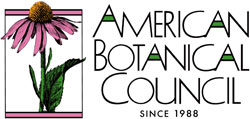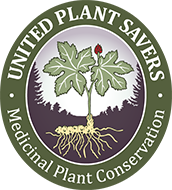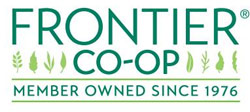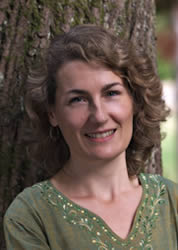
Medicines from the Earth News: Chanchal Cabrera’s Biophilia Intensive
Speaker Chanchal Cabrera is a medical herbalist practicing on Vancouver Island, Canada. She lives at Innisfree Farm, a 7-acre botanical reserve and herb farm she and her husband Thierry Vrain created over the last ten years.
Linnea Wardwell spoke with Chanchal last week to find out more about biophilia, the instinctive bond humans have for all other life forms on the planet. It shapes her recent work on the farm, and is also the subject of the intensive workshop on Saturday afternoon at the symposium.
LW: Whenever we have a chance to chat, it seems there are new initiatives in your practice and farm activities. We’d like to find out what’s going on recently.
CC: Oh, that is a big question! I am always busy and always dreaming and scheming for the next opportunity to spread the word about herbal medicine.
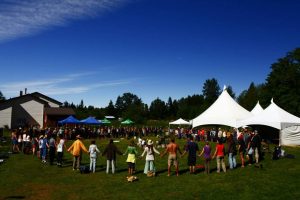 Since my 4 months of training at Kew Gardens in 2013 and 2014, the farm has been listed on the international register of botanic gardens, one of 7 registered gardens in BC. Our specialty is medicine and food plants but we are also offering more and more education as well. We are running workshops, hosting events and teaching classes. Last year the 2nd biennial Vancouver Island Herb Gathering at Innisfree Farm had 270 people attend over 4 days. Next one is June 2017!
Since my 4 months of training at Kew Gardens in 2013 and 2014, the farm has been listed on the international register of botanic gardens, one of 7 registered gardens in BC. Our specialty is medicine and food plants but we are also offering more and more education as well. We are running workshops, hosting events and teaching classes. Last year the 2nd biennial Vancouver Island Herb Gathering at Innisfree Farm had 270 people attend over 4 days. Next one is June 2017!
On top of that, I am still running the botanical medicine department at the Boucher Institute of Naturopathic Medicine in Vancouver, as well, so plenty to keep me busy.
LW: You’ve been a practicing medical herbalist since 1987 and were made a Fellow by the National Institute of Medical Herbalists (the United Kingdom’s leading professional body representing herbal practitioners) in 2009. What is the main focus of your clinical practice?
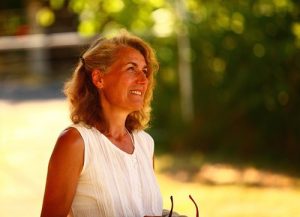
CC: Actually, the newest thing that I am really pleased to report is that I have opened a student training clinic. Right now it is once a month but I am hoping to open more days as soon as students are ready to commit.
I supervised a weekly student clinic for 8 years in Vancouver and it was a great way to teach – direct, hands on, real time learning. Also, of course, a great way to provide affordable health care to your community. The patients pay by donation, whatever they want to give. I have 12 advanced students working with me right now and I am working with 2 naturopathic doctors who are actually going to be supervising all the clinical appointments. We are signing off their clinical hours and giving them a pretty rigorous training.
I am also running a Summer Herb Camp for practitioners to bring cases and get feedback and guidance, and have an opportunity to learn through as review and discussion. This is like peer counseling where students will put forward cases and there will be a facilitated discussion and prescribing process. Learning by doing.
LW You also are very committed to the therapeutic benefits for the individual and society of being in nature. How did you become interested in this aspect of healing?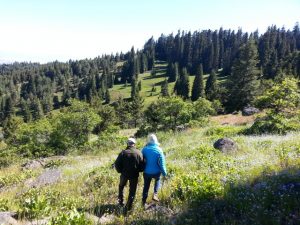
CC: Honestly, it has always just been completely obvious to me and I don’t think I ever questioned it, not even for a moment. I grew up in deep country on a small family farm, all organic and we kids were running around pretty free in the woods and rivers all day. I was picking and pressing and identifying flowers by 9 years old. I was in my early 20s when I went to herb school and I just knew I had found my calling.
I always knew that connection to Nature was connection to Source and it was always a source of strength and solace to me to be in Nature. I was writing in 2000 / 2001 in my book on Fibromyalgia about how disassociation from nature, urbanization and isolation, are the source of so many modern ailments.
When I was doing graduate school and crunching numbers for statistical analysis of my data, I had an epiphany that I needed to work with Nature. With herbs, with real plants not tinctures in a bottle, not capsules, not isolates and super concentrates and standardized extracts, not any of those highly processed, semi-synthetic botanical pharmaceuticals. What that great realization, that revelation, meant for me is that no sooner did I get my Master’s degree in herbal medicine but then I turned around and enrolled in a diploma program on Horticulture Therapy.
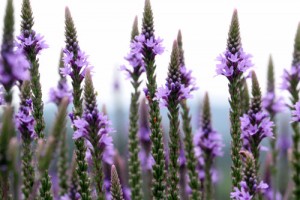 So now I garden as much as I can, I try to be outside every day, and I encourage my patients to arrive early or stay after an appointment to be able to walk in the labyrinth or walk in the gardens.
So now I garden as much as I can, I try to be outside every day, and I encourage my patients to arrive early or stay after an appointment to be able to walk in the labyrinth or walk in the gardens.
LW: Communication with the natural world can take many forms…is this what you’ll be covering in your intensive on Biophilia in June?
CC: Yes, exactly. We will be doing experiential learning outside in the woods and we’ll be back in the classroom discussing how to integrate this into clinical practice. We will consider meditation and medicine, spirit and science, and how a herbal practitioner can bring this into their daily work.
LW: What benefits have you seen in your patients when they are steered toward these activities?
CC: When patients can see the herbs they are taking, can observe them as they grow, taste them, smell them, maybe even take cuttings to grow themselves, they’re much more engaged in their own healing process. Just taking herbal pill instead of a drug does not do anything to alter their relationship to health, disease or the natural world. I am interested in changing people’s thought process, in giving them insights and tools to take more responsibility for their one well being, in empowering people to think well, feel well and be well.
LW: Thank you Chanchal–we are looking forward to seeing you in June!
Chanchal is also presenting a two-part lecture on formulation on Sunday at Medicines from the Earth, and has given lectures on a wide range of topics at past conferences.



